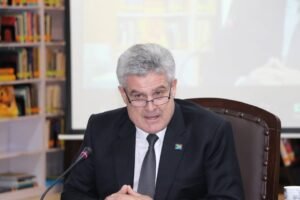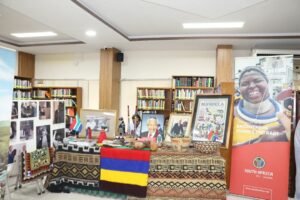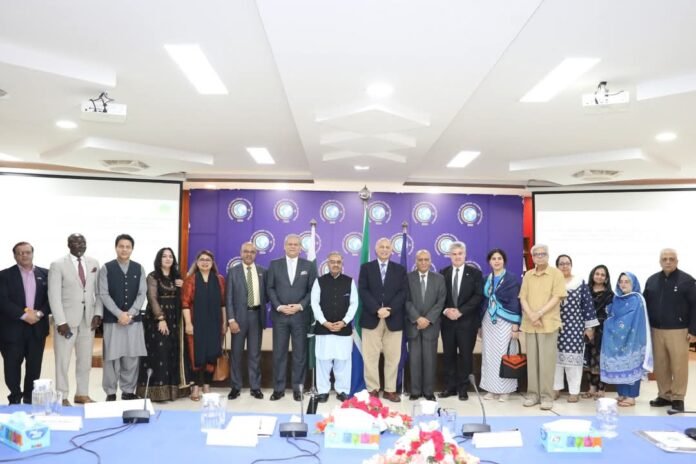South African High Commissioner Highlights Mandela’s Power to Unite a Nation
ISSI Celebrates Nelson Mandela International Day

Islamabad – 8 August, 2025 (Adnan Hameed) : The Centre for Afghanistan, Middle East and Africa (CAMEA) at the Institute of Strategic Studies Islamabad (ISSI), in collaboration with the Ministry of Foreign Affairs and the Pakistan Africa Institute for Development and Research (PAIDAR), organized an event to commemorate Nelson Mandela International Day. The proceedings, which began with the national anthems of Pakistan and South Africa, were moderated by Sarah Akram, Research Fellow, CAMEA. Speakers included Ambassador Sohail Mahmood, Director General ISSI; Rudolph Pierre Jordaan, Acting High Commissioner of South Africa to Pakistan; Malik Muhammad Farooq, High Commissioner of Pakistan to South Africa; and Ambassador Khalid Mahmood, Chairman BOG ISSI. The Keynote Speaker was Ambassador Hamid Asghar Khan, Additional Secretary (Africa), Ministry of Foreign Affairs and Chief Guest on the occasion was Senator Mushahid Hussain Sayed, President PAIDAR.

Senator Mushahid Hussain Sayed said that as a Pakistani, he has often been struck by the similarities between Quaid-e-Azam Muhammad Ali Jinnah and Nelson Mandela and added that the latter was a strong supporter of self-determination for the people of Palestine and Kashmir. He praised Mandela’s ability to connect with the grassroots, speaking the language of the masses, and highlighted his generosity and deep commitment to friendships. He stressed that the greatness of Mandela must be recognised, describing him as a shared heritage and a global role model for peace and reconciliation. Underscoring the role of education as a vital bridge between cultures and continents, he proposed renaming one of Pakistan’s Universities in Mandela’s honour and inviting students from the Global South.
In his remarks, Ambassador Sohail Mahmood paid tribute to Nelson Mandela, describing him as one of the most iconic figures who reshaped the moral compass of our times and stood firmly for justice, equality, and human dignity. He recalled Mandela’s 27 years of incarceration, during which his spirit remained unbroken and his commitment to non-violence unwavering. After his release, Mandela transformed personal suffering into national healing, promoting justice, tackling poverty, and empowering youth. His universal vision of freedom and moral clarity made him a truly transformative leader. Ambassador Sohail highlighted Mandela’s visits to Pakistan, especially his historic visit to the Institute of Strategic Studies Islamabad in 1992. He praised South Africa’s move at the International Court of Justice in support of the Palestinian cause as a reflection of Mandela’s enduring principles, and emphasized the need for moral courage in the pursuit of justice. He also noted Africa’s growing potential and urged deeper Pakistan-Africa engagement. Mandela, he concluded, remains a guiding light for humanity and a living legacy for a more just and equitable world.
Ambassador Hamid Asghar, in his remarks, paid tribute to Nelson Mandela as one of the most admired figures in recent history who stood for justice, equality, and against discrimination. He recalled Mandela’s long years of imprisonment, his unwavering commitment to a non-violent struggle, and his focus on freedom, justice, anti-corruption, poverty alleviation, youth empowerment, and land reforms as president. Highlighting Africa as the continent of the future, he noted Pakistan’s principled support for liberation movements and praised South Africa’s efforts at the ICJ as upholding Mandela’s legacy.
South African High Commissioner – Rudolph Pierre Jordaan, highlighted that Nelson Mandela was more than a political leader; he was a symbol of moral courage, unity, and justice. He stated that Mandela once said, “If I did not leave my bitterness and hatred behind, I would still be in prison,” after spending 27 years incarcerated for opposing apartheid. He added that Mandela believed in action, not just words, and recalled how Mandela united South Africa during the 1995 Rugby World Cup despite opposition within his own party.
Ambassador Malik Muhammad Farooq hailed Nelson Mandela as a global symbol of justice and reconciliation whose principles continue to provide guidance. He recalled Pakistan’s steadfast support for South Africa’s struggle for independence and noted that Mandela paid two historic visits to Pakistan. During one of these visits, he addressed the Joint Session of Parliament and was also awarded the highest civil award, the Nishan-e-Pakistan. He urged that communities should be brought together in the spirit of Mandela’s lifelong fight against oppression and his vision of a just and inclusive world.
Ambassador Khalid Mahmood, in his concluding remarks, described Nelson Mandela as a symbol of peace, justice, equality, and reconciliation. He noted that Mandela’s legacy continues to inspire South Africa and the world. He highlighted Mandela’s two visits to Pakistan, including one to ISSI, underscoring his enduring influence as a beacon of hope for those facing adversity today.
The event also feathered an exhibition organized by the High Commission of South Africa in Pakistan to pay tribute to the legacy of Nelson Mandela.







